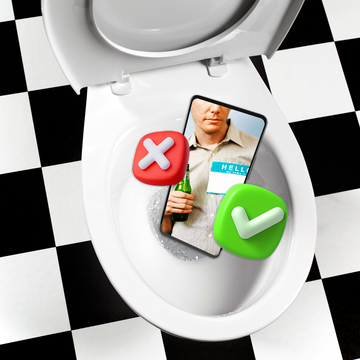You know that fishy behaviors—a sky-high Snapchat score, muted notifications, unexplained disappearances—can all be signs someone isn't right for you. But what about fishy smells? An old wives tale about bacterial vaginosis, an infection marked by fishy-scented discharge, might make you think so, but we’re here to debunk that myth once and for all. (Because, spoiler alert, the only thing that proves incompatibility is the person you’re dating, not your vagina.)
First, let’s back up. Bacterial vaginosis is the most common vaginal infection. Yet, “there’s a lot of stigmatization, misinformation, and myths surrounding bacterial vaginosis,” says board-certified obstetrician and gynecologist Erica Montes, M.D., FACOG, a provider with Organon, a world-wide women’s health company. Perhaps the most pervasive being that if you get bacterial vaginosis after having sex with someone, it’s your body’s way of telling you you aren’t compatible with them.
Where exactly this old wive’s tale originated is unclear, but it could have to do with the prevalent spread of misinformation that bacterial vaginosis is an STI. It's not (more on that later), but because repeated sexual activity could raise your chances of contracting it, and because it’s a condition that can result in irritation and inflammation of the vagina (similar to some STIs), it’s easy to see why some might think that if your partner “gave you” bacterial vaginosis, it must mean they’re either cheating on you, or that your body just isn't reacting well to theirs, thus making you "incompatible."
To be crystal clear: Getting bacterial vaginosis is not a sign that the 20 to 60 percent of vagina-owners who’ve had the infection aren’t compatible with their partners. “It’s just a sign that there is an imbalance of bacteria in the vaginal environment—and it’s nobody's fault,” says Dr. Montes.
Ahead, women’s health providers tackle this myth head-on, explaining what bacterial vaginosis is, what actually causes it, what to do if you think you might have it, and seven protocols to implement to help reduce risk.
What Is Bacterial Vaginosis?
Bacterial vaginosis (BV) is a vaginal infection caused when the natural bacteria inside the vaginal canal get thrown out of whack, explains women’s health specialist Sophia Yen, MD, MPH, the co-founder and Chief Medical Officer of Pandia Health, a women-led online hormonal health clinic. More specifically, it's caused when there is an overpopulation of a type of “bad” bacteria (called Gardnerella vaginalis).
The telltale symptom of bacterial vaginosis is a foul, fish-like odor. According to Dr. Yen, the abundance of that “bad” bacteria leads the body to release a discharge that is far more watery than usual discharge, and the bacterial make-up of it leads to a shift in scent. “The scent is especially likely to be fishy if you’ve recently come into contact with semen,” she says, as the pH level of ejaculate can react with the bacteria in such a way that it becomes odorous. Itching and inflammation in and around the vaginal opening is another common symptom.
The good news: Bacterial vaginosis can be easily treated with either an oral or suppository prescription antibiotic, says Dr. Montes.
Again, Bacterial Vaginosis Is Not a Sexually Transmitted Infection...
Bacterial vaginosis, unlike gonorrhea and chlamydia, is not transmitted sexually through skin-to-skin contact, nor through the exchange of bodily fluids. Actually, bacterial vaginosis is an infection that can only occur in the vagina—it cannot be transmitted to a penis-owning partner, nor contracted from a person with a penis, says Dr. Yen. There is also no such thing as anal bacterial vaginosis.
As for what causes bacterial vaginosis? “Anything that upsets the natural harmony of the bacteria in the vaginal canal,” says Dr. Yen. Depending on what your particular internal bacterial make-up is, in theory, that can be anything that goes in or touches your vagina and/or vulva.
The most common culprits of BV are fragrant detergents and soaps, scented hygiene products or toilet paper, having sex of any kind, or using pleasure aids like lubricants, arousal-aids, or massage oils, says Dr. Montes. (More on this ahead).
…but You May Be More Likely to Get it After Sex
Be it solo or partnered, external or penetrative, manual or oral, sex can introduce new bacteria into or around the vagina that can upset the natural microbiome of the vagina, says Dr. Yen. After all, “each person has bacteria that naturally live in and on their skin and genitals,” she explains. So, having sex—and especially being sexually active with multiple people—can put you at greater risk for infection, she says.
Asking your partner to wash their hands thoroughly or wipe down their penis with a scent-free wet-wipe ahead of play isn’t a bad idea, since it can reduce the risk that they accidentally introduce foreign bacteria to your bits. But to be clear: Getting bacterial vaginosis after laying in the hay with someone does not mean that person "gave you" an infection. It just means that new bacteria was introduced to your vagina.
The pleasure aids someone uses to enhance their sexy-time may also contribute to increased risk of infection, adds Dr. Montes. “If it contains chemicals or fragrances, it’s possible for it to alter your vaginal environment and could lead to an imbalance of bacteria and contribute to a vaginal infection for some,” she says. That’s why she recommends only using lubricants and condoms that are unscented and free from warming, numbing, or tingling chemicals.
Your Partner Isn’t to Blame for Your Recurrent BV Infections
Accompanied by objectively unpleasant wafting odors, watery discharge, and external and internal itching, getting a bacterial vaginosis infection is about as fun as… a dinner date with a narcissist. Meaning, not.
Unfortunately, many people who get BV get it over and over again. The BV recurrence rate within 12 months in a group of women who participated in a study by the Melbourne Sexual Health Center was 58 percent. People who smoke, have multiple sexual partners, recently (or regularly) used antibiotics, or use an IUD or hormonal contraceptive are at an especially high risk for recurrence.
Usually, it recurs because someone did not take the medication exactly as prescribed, says Dr. Montes. But it can also just recur because the bacterial make-up of the vagina is sensitive. “I cannot say this enough, but getting bacterial vaginosis is really not anyone’s fault, nor is there some bigger meaning behind it,” she says.
You Don’t Have to Break up With Your Partner to Stop Recurrent BV
“The risk of bacterial vaginosis shouldn’t stop you from having fun in the bedroom,” says Dr. Montes. Or stop you from having fun with your current partner(s). Instead, she suggests implementing the following seven protocols to lower your risk for getting BV.
1. Call up your doc.
Whether this is your first time ever experiencing the symptoms associated with BV, or you have enough experience to recognize your symptoms in a pinch, dial your doc.
“Whatever vulva or vaginal symptoms you’re experiencing, the best thing to do is to talk to your healthcare provider to determine the appropriate treatment plan,” says Dr. Montes. Trying to self-diagnose and self-treat BV can just prolong your symptoms, she says. This is especially true if you misdiagnose yourself as having a yeast infection.
(FTR: Yeast infections aren’t known to cause fish-scented, watery discharge. Most commonly, they cause chunky, cottage cheese-like discharge, itching, and inflammation around the vaginal opening.)
2. Quit douching… for real!
It’s common for folks who recently had the infection try to prevent it by over-cleaning their genitals (aka, douching), says Dr. Yen. But the vagina is known as a self-cleaning machine for a reason: It does not need to be washed internally.
So, unfortch, over-cleaning can actually throw off the balance of good and bad bacteria and increase your risk for the infection you were trying to avoid, she says. Sigh.
3. Wash your sex toys.
“It’s important to properly clean and disinfect anything going into and around the vagina ahead of sex in order to reduce the possibility of bacterial vaginosis-associated bacteria being introduced,” says Dr. Montes. That includes body parts as well as pleasure products.
As far as toys are concerned, she suggests reading the cleaning protocols for the particular pleasure aids you’re using. Most toys have the instructions on their packaging, as well as online. Usually, warm water and a fragrance-free soap will do the trick, she says. You may want to avoid sex toy cleaners and wipes, as the ingredients in those can be irritating for peeps prone to BV.
4. Switch up your sex schedule.
Do you and your partner always get it on at the end of the day between work and showers? Or right after the gym? If so, wait to shag until after you’ve showered—or do it in the shower—and see if that helps.
5. Eye ingredient lists carefully.
It’s possible that you’re continuing to use a product—like a lubricant or barrier protection—that contains an ingredient(s) that’s messing with your vaginal microbiome and causing the infection. That’s why Dr. Montes suggests reading the labels of all your sexual health aids and making sure that they’re free from glycerin (sugar), alcohol, fragrances, dyes, and other additives.
6. Note if the infection becomes recurrent.
In the event that you keep getting BV repeatedly, Dr. Yen says it’s important to let your doctor know. “They may decide to try a different mechanism of treatment or route of administration, like oral rather than topic,” she says.
“Your doctor may also suggest you take a boric acid supplement,” she says, which has been shown to reduce the number of “bad” bacteria in the vagina.
7. Use other metrics of compatibility.
And in case we weren’t super clear before, please! note! Bacterial vaginosis cannot and should not be used to determine overall compatibility or relationship longevity. So rather than depending on the conditions of your vag to gauge compatibility, consider whether you have shared values, good communication, and commitment to individual and shared growth.
In sum: As far as relationship compatibility is concerned, use your gut instinct rather than your vaginal scent as your guide.

Gabrielle Kassel (she/her) is a sex and wellness journalist who writes at the intersection of queerness, sexual health, and pleasure. In addition to being in Cosmopolitan, her work can also be found in publications such as Shape, Well + Good, Women’s Health, Health, Self, Men’s Health, Greatist, and more! In her free time, Gabrielle can be found reviewing one of the nearly 1,000 pleasure products she's tested, reading smut, or recording episodes of the podcast she cohosts called Bad In Bed. Follow her on Instagram @GabrielleKassel.













